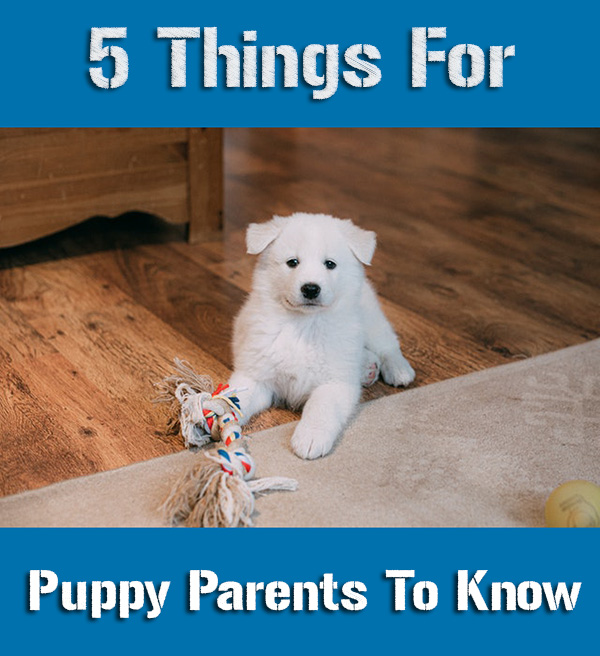Bringing home a puppy is an exciting and wonderful experience. You spend your days watching your fluffy new friend explore its surroundings with fervent curiosity while its unique personality blossoms before you.

However, it’s also an enormous responsibility to care for a puppy. While the first few weeks can be particularly stressful, a bit of training, play, and naps can settle everybody into their new routine in no time. Here are five important things every puppy parent should know.
1. Start Potty Training Immediately
Housebreaking your pet will require a bit of patience, consistent practice, and a whole lot of praise. As soon as you bring your puppy home, it would be best if you began potty-training them. Puppies have to go to the bathroom often, giving you plenty of opportunities to teach them to go outside and avoid indoor accidents.
Typically, puppies will sniff and scratch when they have to go out, and eventually, they may even direct you straight to the door. Be sure to give them lots of praise when they alert you themselves or make in the right place.
Of course, accidents happen, especially when your puppy is housetraining. Just make sure you clean up all accidents quickly to avoid your puppy gravitating to the same spot again.
2. Give Them Their Personal Space
Just like human babies, puppies may have difficulty at bedtime. It’s worth remembering that they are usually deprived of the natural weaning and bonding that occurs with their mothers before turning eight weeks old. During the first few days of bringing a puppy home, experts recommend crating them next to your bed to train them to sleep through the night.
When they get into a sleeping pattern, decide where your puppy’s personal space will be in the house. Their designated area should house their bed and be someplace they can nap or hang out in when they need quiet time.
You’ll want your puppy to feel safe wherever their bed is. Keep a few toys nearby and give them a blanket that smells like you. If you start by using a crate, give them time to adjust to it, as it may seem scary to them at first.
If your puppy cries at night, it’s okay. Feel free to comfort them as they make the difficult transition into their new home.
3. Feed Them a Healthy Diet
Puppies need to be fed three times a day until they are six months old. After that, they should be fed twice a day for the rest of their lives.
When deciding on a pet food brand, it’s important to read food labels and purchase one that uses natural ingredients. Quality ingredients and high amounts of protein are preferable for giving your puppy a long and healthy life.
The same can be said about treats. You’ll probably be using kibble or “cookies” for training purposes, so making sure your puppy consumes healthy treats is critical to their well-being. You can always bake puppy treats with peanut butter yourself, which is an irresistible flavor for dogs at any age.
It’s helpful to speak with a veterinarian to determine the best food to give your puppy. If your puppy has a particular health condition, they may advise you to put them on a special diet.
4. Establish a Relationship With a Vet
Establishing your puppy with a vet should be done soon after they come home with you. According to the contracts you signed, if you got your puppy through a breeder, a veterinary examination within three days may be required. They may also need you to disclose any annual physicals and vaccinations.
If your puppy came from a shelter or rescue center and has an unknown background, bringing them in for an appointment with a veterinarian sooner rather than later is even more critical.
Make sure to set an appointment in advance if you know when you’re picking up your new puppy. Also, consider visiting the vet’s office beforehand to see the facility and speak with staff.
During the first appointment, the vet will take your puppy’s vitals, examine its coat, check its teeth, and feel around its abdomen. You’ll also need to bring a feces sample so they can look for worms.
Take the time to speak with your vet about any concerns you have regarding feeding, training, and your puppy’s health. You may want to discuss microchipping and spaying or neutering, as well.
5. Play With Your Puppy
The best way to bond with your puppy is to play with it. Puppies may be small, but they have a ton of spark and need plenty of attention and exercise.
Spending quality time outside with your pup is excellent for their overall health and provides plenty of space for training. There are several ways to burn some of that pent-up puppy energy, too. Most likely, your puppy will take some time to get used to a leash; however, games like tug-of-war and fetch can be played at home or a park.
While there isn’t a set rule for how long you should walk or play with your puppy, it’s important to consider their breed and size. Long durations of activity could lead to joint and bone damage if your puppy is very young, especially if its breed — for example, the Great Dane — is predisposed to orthopedic conditions. Likewise, breeds like bulldogs or Boston terriers may struggle with exercise in the heat.
A Best Friend for Life
Dogs aren’t just pets; they’re part of the family. Through training and quality time, the bond you create between you and your puppy only sets both of you up for a lifelong friendship and treasured memories.
Remember, they won’t stay a puppy forever, either. Time flies, so enjoy them as they are at this stage.





Speak Your Mind